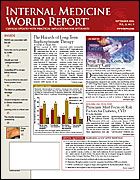Publication
Article
Drugs for Overactive Bladder in the Elderly do not Impair Memory
Author(s):
Arch Intern Med
Recent data indicate that 37% of community-dwelling older adults in the United States have urinary incontinence (. 2006;166:1128-1133), which can significantly reduce the patient’s quality of life and is often accompanied by depression.
Eur Urol
Earlier research suggests that older adults may be susceptible to some of the untoward effects of antimuscarinic agents, now the main agents used for the treatment of overactive bladder (OAB), such as memory problems. A recent multicenter, randomized, double-blind, placebo-controlled study compared the efficacy of 2 antimuscarinics—darifenacin (Enablex) and extended-release (ER) oxybutynin (Ditropan XL)—in the treatment of OAB in the elderly, as well as their effects on memory (. 2006; 50: 317-326).
Both agents act on the muscarinic receptors involved with bladder control and are indicated for the treatment of OAB in patients with symptoms of urge urinary incontinence, urgency, and frequency, and both have shown efficacy in the elderly.
The study included 150 healthy older adults aged ≥60 years who were randomized to 1 of 3 groups: oxybutynin ER, 10 mg/day, increasing to 15 mg/day, then 20 mg/day by week 3; darifenacin, 7.5 mg/day for the first 2 weeks, then 15 mg/day in week 3; or placebo.
Investigators measured delayed recall using the Name-Face Association Test, in which patients are asked to remember the names of 14 people 30 minutes after being introduced to them.
P
P
At the end of 3 weeks of treatment, there were no significant differences in delayed recall between the darifenacin and placebo groups, with a mean difference of only —0.06. But participants treated with oxybutynin ER had significantly lower Name-Face Association Test scores compared with those given either darifenacin (mean difference, —1.24; = .022) or placebo (mean difference, —1.30; = .011).
The researchers concluded that although both agents are effective for treating OAB in the elderly, prescribing darifenacin may spare the patient potential memory problems, a serious consideration in this patient population.
Of note, there were no differences in self-rated memory between the 2 treatment groups, indicating that participants were unaware of their worsening memory.
Despite the availability of effective treatments, whether with medications or with behavioral therapies (eg, bladder training, pelvic muscle—strengthening techniques), only about 57% of elderly patients are being treated for this debilitating condition.






